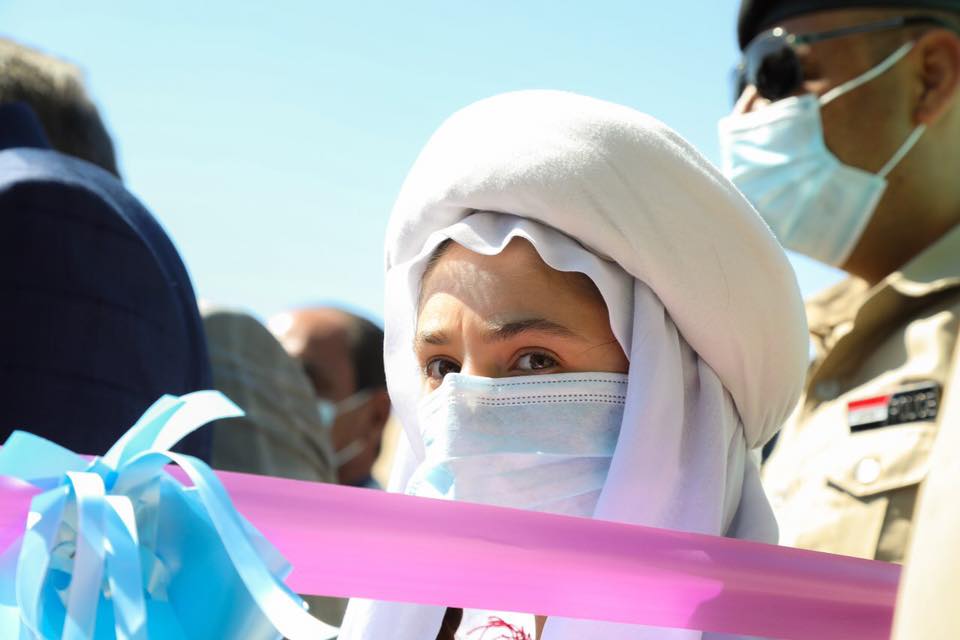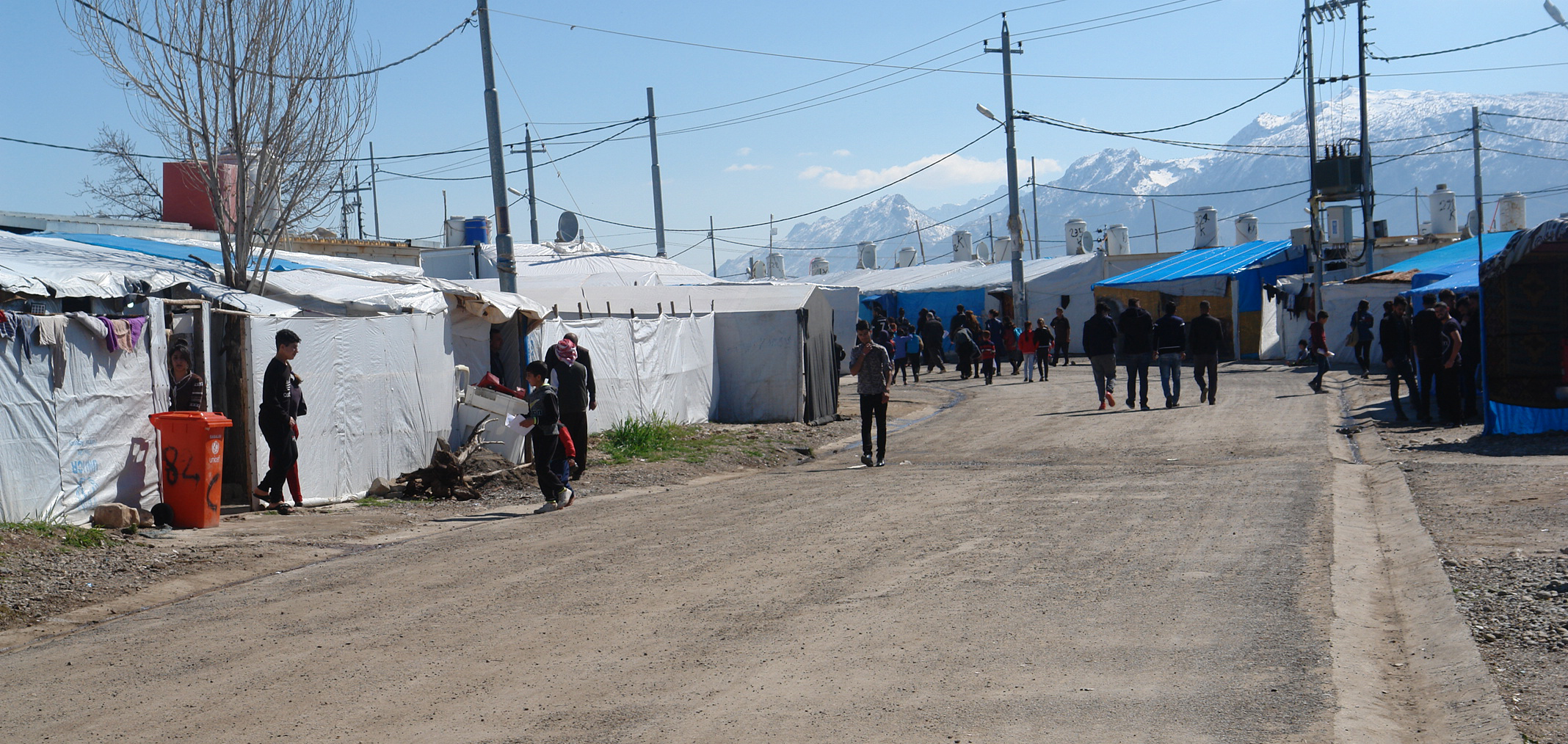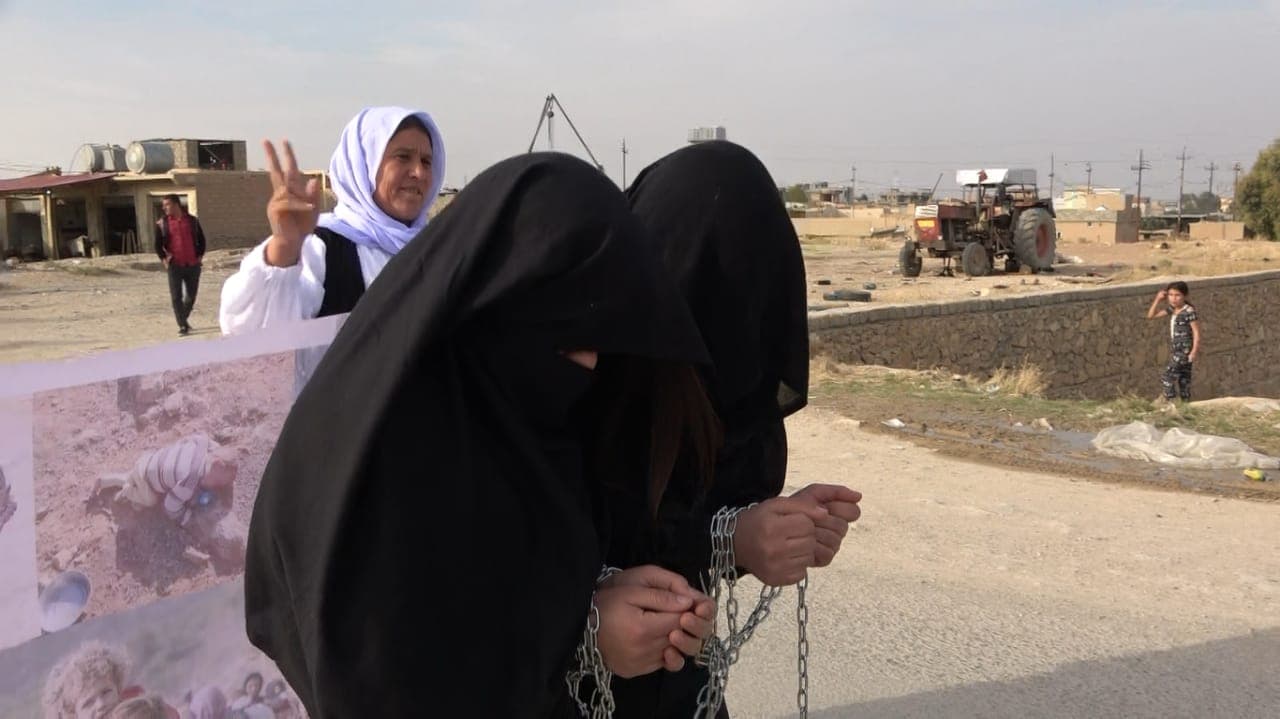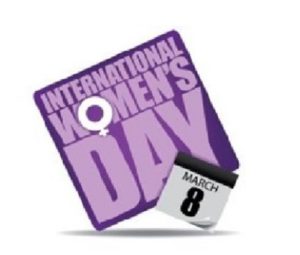
11 Ezidi women survivors of the extremist Islamic state ISIS leave camps of Internally Displaced People IDP in Duhok Northern Province and unite with their children born from IS fighter. The well-planned secret process generated wide protests in the Ezidi community and the spiritual council as Ezidi religion does not recognize children from a non-Ezidi parent in particular of an IS father.
The survivors were living in IDP camps all over Duhok left the camps early March in the excuse of meeting with organizations in Zakho district of Duhok but never made it back home up to day.
Dakhil Bashar Khalaf, resident of Qadia camp, is father of Afraj, one of the women escaped the camp and have not returned.
Khalaf narrates his daughter told him she has and some friends have got a phone call from an organization she doesn’t know the name exactly for meeting and I agreed since she was going with other her friends.
On March 2nd, Khalaf called his daughter at 5 pm. She tells him they are doing well, in a hotel in Zakho and will stay at night because the work they had is not over but did not mention the name of the NGO. The following day, he called her and she said they will stay that day as well. The next day her phone was switched off.
A day before Afraj leaving home, Iraqi parliament passed a law on March 1, 2021 for reparation of Ezidi, Tukrmen, Christian and Shabak women survivors of atrocities by Islamic State in Iraq and Syria ISIS.
The bill provides Ezidi and other minority women who survived the IS massacre with financial support, health care, work opportunities, education, rehabilitation, and reconstruction in their villages and towns. With the establishment of a special governmental department for Ezidi affairs, the bill represents the first recognition in Iraqi history of the minority as a distinct group.
The law, referred to the Iraqi parliament by the Iraqi President Barham Salih in March 2019, was basically drafted to address more sensitive issues, such as dealing with children who were the results of IS rape through a special instance court to be formed accordingly in Shingal, hometown of Ezidis, yet it was skipped based on calls by Ezidi spiritual leaders.

Afraj was captured by IS fighters on March 3, 2014 when IS militants took over Shingal district in Mosul and almost one third of Iraq ruled by an Iron fist till 2017. She was freed five years later on August 25, 2019. She was reunited with her family in Duhok IDP camp but was forced to leave her daughter in Syria. She lives with her brother and father who has got two wives and both live in Germany. Khalaf is a Peshmarga, Kurdish fighter, of Shingal Peshmarga units, one of many armed groups in Shingal, backed by Kurdistan Regions’ Government KRG and Kurdistan Democratic Party KDP, led by Masoud Barzani.
As the family chase the footprints of their daughters, they could not determine their accommodation. A brother of Afraj talked to a companion of his siter on March 4th but she did not tell where they live. “She said Afraj’s phone is out of charge and doesn’t know where they are,” Afraj’s brother told KirkukNow.
Khalaf talked to families of other women whom shared the same stories. “They participated in courses by NGOs several times and stayed out of camp but this time there is no communication and did not tell where are they,” said Khalaf who was obliged to contact security forces.
“On March 5th I have received a voice message from her saying Dad don’t be upset, I am with my daughter and won’t be back to camp. Do not contact police or Asayish (Kurdish security). Please leave us, I am comfortable now,” the father says. Afraj mentions where she is but KirkukNow prefers not to disclose it for safety of Afraj and her colleagues.
“Dad don’t be upset, I am with my daughter and will be back to camp. Do not contact police or Asayish. Please leave us, I am comfortable now,”
Ezidis are an ethno-religious minority over half a million population, mostly residing in Shingal, in northern Iraqi province of Nineveh. The militants of Daesh extremist group in 2014 attacked their communities, killing thousands of men and taking thousands of women and children, in an atrocity the U.N. described as genocide.
Ezidi women faced violence, torture, and rape. Part of them escaped from the IS, and some were rescued or released in return for money. However, the fate of half of them remains unknown even though IS has been defeated. Over 6,500 Ezidis were held captive yet only 3500 were freed and still 2,700 are missing, most women and children, Kurdistan regional government KRG data shows.
Sources aware of the issue, told KirkukNow the process was prearranged by an NGO in cooperation, consultation with and consent of the survivors and the KRG.
Khairi Ali, director of Shingal branch of Ezidi Organization for Documentation, said they were informed that an international organization since months was cooperating with Kurdish forces in Syria and the KRG to reunite children from IS father with their mothers.
“Security forces of KRG were aware when those women left the camps to bring together with their kids brought from Syria to Duhok,” he said. The women were familiar with the organization which in the first stage rehabilitated them psychologically to integrate into community.
KirkukNow was informed the organization is recognized by KRG to operate in IDP camps yet is not disclosed for safety of the staff.
“The women were taken close to Syria borders and received 17 children as some gave birth 2 or three children under ISIS. KRG security were informed and cooperated. Now they live with their children in a private place in Kurdistan region,” he narrates.
“Now they live with their children in a private place in Kurdistan region,” he narrates.
Regarding their future, “they have the option to go to the USA, Canada or some countries in Europe whom already agreed to welcome them. The organization was planning to unite more women with their kids but it has been stopped for consequences of this issue.”
Religion has a vital role in the Ezidi community in the determination of the cases of the Ezidi survivors. On April 24, 2019, the Ezidi spiritual council decided to receive all Ezidi people, including the women, with their children who were rescued from IS.
The statement brought immense condemnation amongst the Yazidi community, especially among the Yazidi religious leaders.
Three days later, the council issued another statement declaring they did not mean accepting those children born of rape but rather those Ezidi women and children who were taken by IS at an early age.
Ezidi women survivors whom gave birth to children from an ISIS fighter, were given two options by their families: reuniting with their families lone or staying in exile with their children.

Religious and social figures of the Ezidi community denounce the process which they deem a threat to Ezidi religion and community and intervention in internal affairs.
Jawhar Ali, deputy of Ezidi Prince, Mir, for media and communication affairs protest the process and call on security forces to unite the women with their parents and relatives.
“They were supposedly taken to see the Pope. We have not been consulted at all. We are really upset and sad, we firmly condemn this act. We call on the government, parliament and the United Nations return the girls to their families and send back the children to the west (Kurdish territories of Syria),” Ali angrily said.
“They claimed they are going to see the Pope. We were not consulted. We are really upset and sad,”
The organization supervised the process prefers to stay anonymous. KirkukNow contacted its director on March 14th. When he was told about this story, he switched off the phone. Messages, Viber calls and WhatsApp voices were not answered.
There are no concrete records of the children born by Ezidi women in ISIS slavery.
Some survivors kept their pregnancy under ISIS in secret while others brought back their children and secretly raise them because they have not registered them. Some are obliged to give their children to the security forces and do not want to take them to their families.
Based on field trips and investigation of KirkukNow in 2019, some of those Ezidi women survivors are protected by the humanitarian organizations until their cases are decided upon. Many were helped to live abroad away from religious and social censorship.
Others earlier talked to KirkukNow agree with Ezidi religious and social beliefs and voluntarily left their children under ISIS.
Nadia Murad, the Yazidi Noble Peace Prize winner, published a video in 2019 showing support for those women who lead a miserable life due to their children.
Murad in the video stated that the first and the final decision should be left to their families because no one can prevent them from taking those steps that are related to them, and if “they decide to come back with their children, then the society should respect their decision, welcome and help them.”
Ezidi women MP decried the process already sorted out religiously and legally. “I talked to the women survivors and 90% of them are not ready to take care of IS kids. If 10% disagree, is almost nothing,” said Khalid Khalil, Ezidi women member of Iraqi parliament.
“I talked to the women survivors and 90% of them are not ready to take care of IS kids. If 10% disagree, is almost nothing,”
“There should be respect for law and the order of Ezidi spiritual council which states ISIS kids are not welcomed.”
Last week, special representative of the secretary general of UN to Iraq SRSG Jeanine Hennis-Plasschaert called on Ezidi MPs to sort out the issue of children for Ezidi women survivors untouched by Iraqi parliament bill regarding the survivors.
“The UN says they have received some complaints and we replied that there is a law passed by the parliament and nothing more can be done. If the cases are up, let relevant authorities sort it out,” Khalil said.
The KRG denies any knowledge about and involvement in the process.
“We have not been consulted so we are not accountable since we have information as you have,” said Hussein Qaidi, in charge of KRG office for liberation of Abducted Ezidis.
The community leaders call for unity against intervention in issues addressed per religion. “Let all ISIS kids be sent back as we do not want them. That was a big mistake and those want to put Ezidis into disagreement with other ethnicities. We will never be silent and this issue has to be addressed,” said prince deputy.
Observers call for a solution in the interest of all.
Ali in charge of the Ezidi NGO believes taking those girls and women in this way has negative impact on their families whom try to find them. “On the other hand, if the girls insist to keep the kids, may be no one agrees to marry them because our religion does not allow to marry and take care of ISIS kid.”
“On the other hand, if the girls insist to keep the kids, may be no one agrees to marry them because our religion does not allow to marry and take care of ISIS kid.”
The parents of the mothers are waiting to unite with their girls by disuniting them from the aftermath of the genocide atrocity.
“I cry every day because I cannot live without her. I ask the security to free my girl. Anyone involved is charged for abduction,” father of Afraj sobbed.
This article can be viewed in Arabic, Kurdish or Turkish via KirkukNow


